#working on that drawing remake i posted today has really given me perspective on how much my art has shifted and improved
Note
Hello ! For the artist ask game. 5 and 19
(Btw Your art is so amazing, i lov sm <3)
5. How would you describe your art style?
This is a tricky one! I find it hard to pin down my art style, it's very loose and I'm always trying to evolve it. A comment I've gotten on it that made me smile was that my art style is reminiscent of the ":]" emoticon.
I think my most obvious style thing is the black lineart with the gaps I do. There's absolutely zero intentionality behind the gaps -- it's just the most natural way for me to do lines lol. I've also been experimenting with slightly colored lineart recently.
19. Where do you find inspiration?
I'm inspired a lot by music I listen to! There are a good number of drawings I've made that've just been inspired by like a song off a Kirby OST. Here's a few good examples.
Another big source of inspiration for me is my friends. Mega-talented genius-brain artists. Always eating their stuff up so nice.
#i've noticed my lines and stuff are a lot smoother and rounder now that i've got the tablet. that makes sense.#working on that drawing remake i posted today has really given me perspective on how much my art has shifted and improved#you can really TELL that two years have passed since the first version and today's version lol.#i'm proud of how far i've come :)
5 notes
·
View notes
Photo
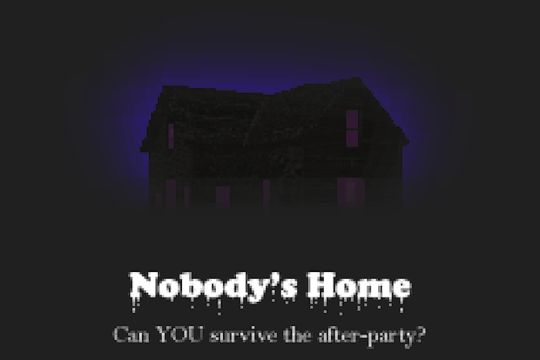
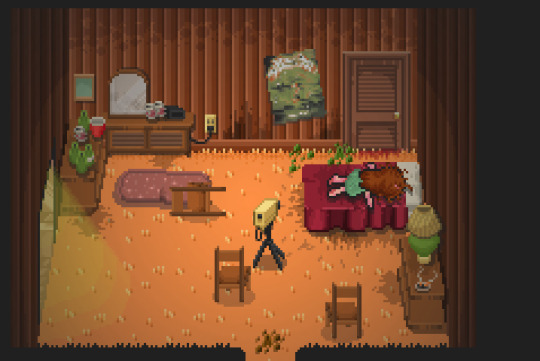
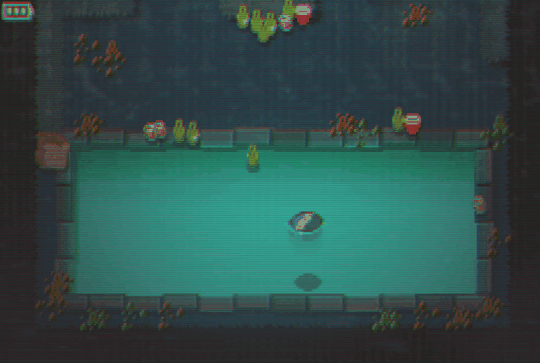

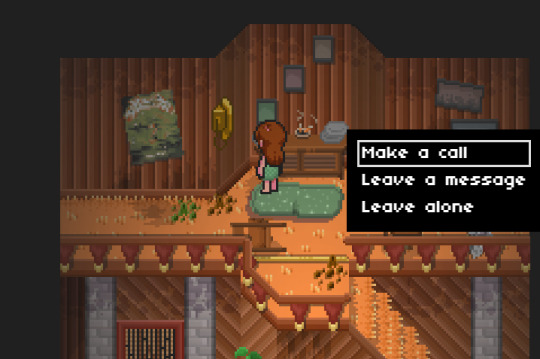
April’s Featured Game: Nobody's Home
DEVELOPER(S): oates
ENGINE: RPG Maker MV
GENRE: Survival Horror
SUMMARY: After a night of extreme drinking and partying, you wake up in stranger's bed to discover... Nobody's Home.
Buy the game here!
Our Interview With The Dev Team Below The Cut!
Introduce yourself!
*oates: Hi, this is oates! I'm a pixel artist and game developer, I've started making games with rpgmaker in 2016 with VX Ace and now currently using MV for recent projects.
Previous projects I've worked on were the FNaF-inspired Souls-like One Night at the Steeze, my first rpgmaker game and it's prequel, the FNaF-inspired roguelike No Delivery. Other games I've worked on include the fangames Day Dreaming Derpy, made in VX Ace and Spike's Day Off, made in MV and the latest in a series of previous fangames previously developed on Adobe Flash.
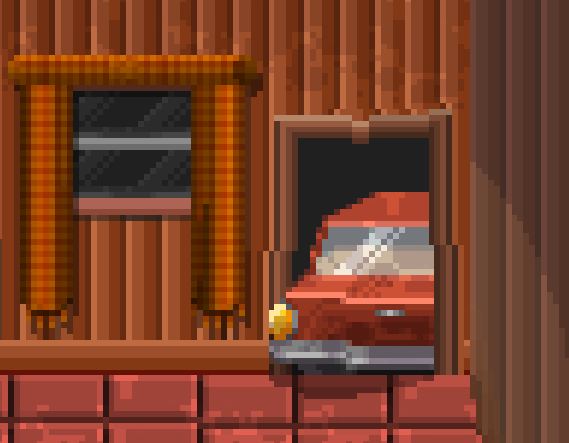
What is your project about? What inspired you to create this game initially?
*oates: Nobody's Home is largely based on my experiments to find and apply horrific elements in modern situations or phenomena. The scenario being explored here in Nobody's Home is the aftermath of some crazy party. Sound design is especially important when crafting a horror scenario, so I often look to music to draw inspiration. Much of the atmosphere and house design was inspired by music and imagery associated with '70s yacht rock (a sub-genre of soft rock).
Another important note is a lot of the general mood and 'weirdness' was inspired by a band I listen a lot to, Dance Gavin Dance, specifically their "deathstar" album. However they have a tendency in all their albums to switch genres mid-song, often going from their post-hardcore sound to funk, pop, and even rap; aside from that, some of the subject matter covered can range from disturbing to unpleasant to nonsensical, but combined with the amazing music, it creates an experience that pulls the listener in all different directions.
It got to the point that I was naming events in the game after some their tracks so I had to be careful not to inadvertently make a fangame haha But there are some easter eggs in Nobody's Home that were intentionally left in, and I'm fairly certain players have identified it already.
How long did you work on your project?
*oates: I used much of the same framework left over from my previous project No Delivery for this development cycle, so the hassle for setting up asset pipelines was very much mitigated. I started in earnest, making assets back in January this year so it took roughly 2+ months to finish development for this project.
Did any other games or media influence aspects of your project?
*oates: Aside from the previous music inspirations, I was really intrigued with the way Resident Evil 7's Beginning Hour demo was able to pick up where Konami's cancelled PT left off in terms of survival horror games to look forward to back in 2017. Prior to later updates, the initial demo really only included a few set pieces, basic item interaction, and almost no puzzles from the full game. It was largely able to pull off scaring players from almost atmosphere alone (if you exclude the Jack Baker and ghost encounters). It was later in the full game that it was able to show off it's metroidvania-esque design to its fullest.
After my previous project, I wanted to step away from roguelike design for a bit and focus a little more on an exploration-based experience, so I took a few notes from the way RE7 and RE2: Remake handled map design and progression.
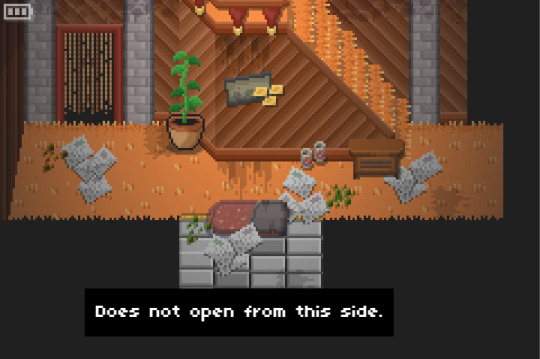
Did you come across any challenges during development? How did you overcome or work around them?
*oates: I was coming off a severe cold last year and it took most of January for me to recover, so it was a little hard to start full-on development immediately like I normally would on top of other career matters.
And looking at events today, it's even more imperative that developers practice healthy habits during development.
Did any aspects of your project change over time? How does your current project differ from your initial concept?
*oates: I've had the idea for Nobody's Home as a concept for a while, but filling in those gaps with actual gameplay between centerpieces was a big variable. I went back and forth between the turn-based item combat from the previous project to cutting out combat entirely. While I didn't implement it, I also brainstormed a few concepts for overworld action and combat ala Zelda, but it seemed too complex given the time frame I set for myself. Eventually I settled on a middle ground between full combat and separate encounters, with "enemies" acting as essentially a toll gate. The rest of the game followed suit with various tolls and "mouse traps" for the player to trigger at their own behest. This wasn't necessarily the design I had in mind at first, but it helped to concisely fill a relatively small location with specifically "deadly" content.
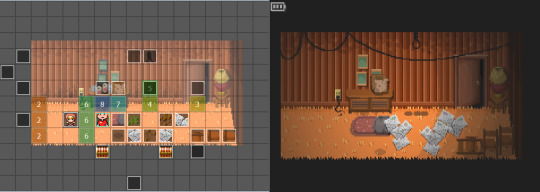
What was your team like at the beginning? How did people join the team? If you don’t have a team, do you wish you had one or do you prefer working alone?
*oates: I largely work solo for both development and art, but I do regularly work with a few musicians for an original soundtrack. I first started working with other composers for the fangame Day Dreaming Derpy, where after the initial demo was released, I received emails from a few musicians volunteering to contribute some tracks for the game. In all, the original soundtrack contained 9 tracks in total, with 3 tracks from each composer; each of them doing an amazing job and, in my opinion brought the project back then to a higher degree of quality. This was how I met some of the composers I still work with today and they all have some really great work!
TheNGVirus @NGVirusNG1
Kaminakat @thekaminakat
dRedder @HornyGremlin
What is the best part of developing a game?
*oates: It's a toss up between the initial brainstorming/research and the first run-through when you have your desired maps linked together. For the brainstorming, it's pretty fun to learn about subject matter you want to do justice to as well as stretching your creative muscles for the first time in service to a certain concept. However this obviously wears off when you devote too much time to a particular concept, but it's still enjoyable nevertheless. For making that run-through, it doesn't necessarily mean to have all the events implemented, but to experience your game the way players will experience it for the first time does give a sense of completion/cohesion to what you, as a developer, are trying to accomplish. It essentially puts what you're working on into a different perspective for you.
Do you find yourself playing other RPG Maker games to see what you can do with the engine, or do you prefer to do your own thing?
*oates: I do keep an eye out for what other rpgmaker projects are doing, and to see what others can do with the engine helps get the creative juices flowing; it's also fun to try to mentally reverse engineer how certain mechanics or effects were made. And it's always great to see fellow devs showcase what's possible with the engine.
Which character in your game do you relate to the most and why? (Alternatively: Who is your favorite character and why?)
*oates: Nobody's Home has a relatively small cast of characters, whom you do interact with but never see, this is largely to done to create a sense of "un-relatability", but if I had to pick a character, it'd be "car guy", the guy you find stuck in the car.
They have a good line, " ...there'd be a good reason for this, but there isn't..."
Story of my life.
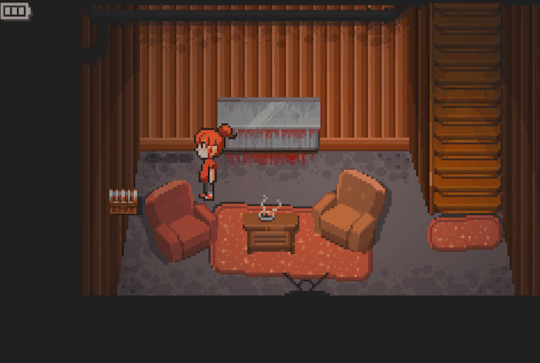
Looking back now, is there anything that regret/wish you had done differently?
*oates: There were a few areas I would have liked to expand on or add, specifically- the attic + roof, the front lawn, behind the walls, and an entire second floor. Unfortunately that meant potentially adding more questlines and NPCs while the first set of questlines were pretty interwoven so it would have been way more complex, also again, given the time frame I set, it would have extended the development cycle way beyond what I had time for.
But if I had implemented those extra areas, the game's length would also go way beyond the 30 min - 1 hr it takes to complete the game as it is now.
Do you plan to explore the game’s universe and characters further in subsequent projects, or leave it as-is?
*oates: I'd like to do both really, each installment of the VCRPG line of games is definitely a stand-alone story, or an isolated incident, but I would love to explore the aftermath of the game's events and how the passage of time ravages and twists the story into urban legend. I like to treat places and environments like characters as well, capable of making memories, being misunderstood, preserved, destroyed, and ultimately capable of change.
What do you most look forward to upon finishing the game?
*oates: Both the fan reaction and free time honestly speaking. Once the development cycle finishes and the game is published, your work isn't really finished as there's always a chance someone's feedback can apply to immediate changes or patches you can implement, even during the release period. Marketing is also another large step to take into consideration after release, this includes tweeting, sending keys for lets plays, etc. Watching playthroughs is also a really good way to collect data on what parts of your design fall through and what fail to land.
But after all that is said and done, some free time really helps the brain recuperate.
Was there something you were afraid of concerning the development or the release of your game?
*oates: Just whether or not I handled the game's subject matter tastefully. Like horror cinema, everything done is in service the the themes and message of the piece as a whole.
Do you have any advice for upcoming devs?
*oates: The game engine is essentially a tool, and like any tool you can find plenty of creative ways to get the same result.
And don't be afraid to research whatever it is you need help with, it also helps to be specific with what you want.
Question from last month's featured dev @moca-pz: If you can collaborate with any game developer in the world, who would it be? What would be their role(s) and what would be your role(s)?
*oates: Game developer I'd like to work with: Hidetaka Miyazaki
His role: Story Lead and Director
My role: Drinking buddy
Game we're working on: SciFi Souls
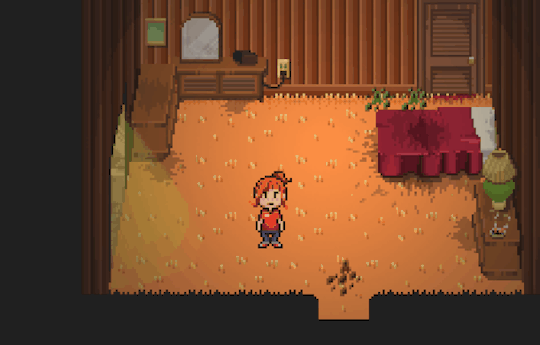
We mods would like to thank oates for agreeing to our interview! We believe that featuring the developer and their creative process is just as important as featuring the final product. Hopefully this Q&A segment has been an entertaining and insightful experience for everyone involved!
Remember to check out Nobody's Home if you haven’t already! See you next month!
- Mods Gold & Platinum
#rpg maker#nobody's home (game)#nobodys home#nobody's home#game#rpgmaker horror#pixel horror#horror game#indie game#gotm#game of the month#oates#gotm 2020#2020#april#april 2020
325 notes
·
View notes
Text
A tribute to the books I read in 2016
I’ve read 65 books last year and that’s probably the biggest thing I did so far.
I’ve finished a few I didn’t think I would ever finish. Invisible Jest is one example another is A Dream of Red Mansions. I didn’t read any graphic novels last year, which was stupid because I’ve read three already this year and how delightful are they?
I started the year 2016 with reading Post-Democracy by Colin Crouch which is ironic if I think about how 2016 ended and how 2017 started (in this spirit I’ve been reading a lot about defiance since the first of January).
I continued with Crush by Richard Siken - a book that I owned since at least 2010, that I took with me to Prague when I drunkenly kissed my roommate and didn’t tell my boyfriend. I remember sitting in the bus taking me to Prague and skimming through the pages and everything felt too raw and real and I did not know what to think about myself now that I knew that somewhere inside me a cheating beast only waited to take power. It took me six years to read Siken again and while his words a still powerful they did not rip something apart inside of me any longer.
After crush there came my first try with an English translation of 紅樓夢. I finished that book and didn’t understand a thing and kept wondering if I had suddenly lost the ability to read in English. I found out not soon after that I had bought one of the worst and incomplete versions out there and ordered another one and said goodbye to despairing about language.
After this first try with Dream of a Red Chamber, I read Anti-Politics Machine by James Ferguson. That book was an eye-opener and set the tone for the rest of the year during which I put a lot of emphasis in my academic life on studying development. It was also the last book my ex-boyfriend recommended to me.
At this point I was missing my Russian writers and read the Vagabond by Gorky. I’ve always loved Gorky and the Vagabond was no exception, but it did not strike a tone as deep inside of me as some others. There were some stories I loved and others that did not stir much interest.
After Gorky, I read We wish to inform you that tomorrow we will be killed with our families by Philip Gourevitch. That book is probably my book of 2016; the horrors of it stayed with me for weeks. There isn’t another one I’ve recommended this much since reading it and I had to stalk Gourevitch on all available platforms. Go read that book! If we talk about a human history of suffering and how we all need to understand our own histories of failure in protecting innocent lives this is one of the must-reads.
After Gourevitch my new edition of Dream of a Red Chamber finally arrived. I plunged into it and even though it has some 2500 odd pages I finished it under two months. Its story was captivating and I loved the style of the first books, even though the style of the last was somewhat disappointing (it is believed that the original writer did not finish the whole book and that parts of it were rewritten by others that remain anonymous).
Following this long book I needed something shorter and read some poems by Bukowski. I have a conflicted relationship with Bukowski (admiring his talent, loving his books but hating him as a person) and I did not enjoy those poems (Continental Edition, I think) as much as others, but there where still sentences that went straight into my heart.
When I finished Bukowski I was missing some Chinese authors again and read Grass Soup by Zhang Xianliang and then something more academic by Xin Liu (In One’s Own Shadow). Both were disturbing in their own ways (hunger for Zhang, marriage rituals for Xin) and I did not much like either.
Next I wanted to read a novel again and kind of stumbled upon Confessions of Zeno by Italo Svevo. Zeno was beautifully written and explored a lot of the light and dark sides that make us human but I started to tolerate books writing discriminately against women a lot less in the last years and though Zeno is a product of its time, I could not enjoy it despite its brilliance.
Following Svevo I realized I hadn’t read anything in German for some time and I read another book of one of my favorite authors, Heinrich Böll. Und sagte kein einziges Wort explored some of his usual themes, but for me it didn’t quite do what some of his other books did, even though it was fascinating as always to know what Germany looked liked straight after the war.
Missing James Ferguson’s brilliance I read another one of this books next. Global Shadows: Africa in the Neoliberal World Order was another book that gave me a lot to think about and I jotted down some thesis ideas. The neoliberal script has been another big private and academic topic for me in 2016.
After Ferguson I spent a Sunday browsing some flea markets and came home with a lot of books whose authors I had never heard of before. I started off with Dispatches by Michael Herr, which was a brutal portrait of men and war and which I kind of had to read in a one go night session.
After Herr, university started again and gave me a lot of reading ideas. I read Lu Xun’s Diary of a Madman next, in the bilingual version and loved it, and then thanks to the feminist perspectives I followed throughout 2016, I continued with a German book about a series of talks between Judith Butler and Gayatri Spivak on language and power.
The questions of power and language and discourses that shape my Western understanding of the world made me remember Orientalism by Edward Said, which was on my to read list for the longest time and I went and picked up a copy and finally read it. While some of it wasn’t exactly new I started to be a lot more critical and saw Orientalism everywhere and understood where some of the prejudices against Muslim immigrants were coming from. Said is brilliant.
After Said, I read a book of a lot of African authors that was edited by a NGO (Africavenir) on Defiance, Revolution and Renaissance. I liked that one a lot (always an advocate for reading more texts by authors of color), but its focus was a bit too heavy on the Arab Spring for my liking. African Renaissance shouldn’t be broken down on North Africa, I think, and I wish the book would have been more specific about its own focus.
Next I had to read Chronicle of a Blood Merchant by Yu Hua for university, which hasn’t a hardship at all, because I always loved Yu Hua. The Chronicle was just as wonderful as most of his other books, though being a squirmish person, I did have some trouble with all the blood talking.
I went book-shopping once more and bought some books by Cynthia Enloe, who was recommended during one of my feminist peace studies classes. I read Bananas, Beaches and Bases first with the promise, that it would change the way I viewed the world, and in a way it might just have done that, but I wish I would have known about the updated version that came out only a while back, because the examples kind of lacked actuality for me.
I read the Deer Park by Mailer next and was impressed by the language and the feeling of the book but similar to Svevo what impressed me a lot less and bothered me quite a lot was the portrayal of women. Again, a book of its time, but one that is still considered a masterpiece today and I am unsure where to draw the line between being impressed by talent and being disgusted by patriarchy.
I had to do some more reading for class after that one and read Northern Girls by Sheng Keyi next. I hated the coarse language at first, but surprisingly started loving the story (but the ending is weird). I am usually a stronger advocate for language than for plot but this book finished much stronger than I expected.
I returned to feminist literature next and first read Butler’s Krieg und Affekt, followed by another Enloe: the curious feminist. I liked both of them and started to incorporate a feminist perspective in my academic life after finishing them.
Afterwards I finally finished a book I started reading at the beginning of 2014: Europe: The Struggle for Supremacy from 1453 to the Present by Brendam Simms. It was quite the fascinating read though in the spirit of anti-power discourses I was a bit bored with another great power view on the way our world works, but I learned a lot of new stuff (and was quite happy to put it aside after two years...).
I went home next and re-read a book that I had not quite finished when I gave it to my Dad as a present back when we visited me in China: China 3.0 by Mark Leonard. It’s quite short and might not be up to date any longer, but the perspectives on China remain interesting.
Next I stumbled upon a book that appears to be a classic in feminist literature: The yellow wallpaper by Charlotte Perkins Gilman. I read that book using a new app for my iphone that really changed my reading because you can read chapters of classical books in 5 to 15 minutes depending on length. The app is called Serial Reader and whoever invented it: a huge thank you, I doubt I would have read quite that much in 2016 otherwise.
I read another Bukowski next, Ham on Rye which I liked better than the poems I read earlier this year. Still immensely impressed by this man’s talent, still immensely impressed by the personal ruin he followed through all his life.
I read Art of War by Sun Tzu next which was very anti-climatic given how much this book has been talked about in the last decades. Warfare strategy appears to bore me.
After Sun Tzu I started reading Anton Chekhov and started off with the Bet and Other Stories. I love Russian authors and while I usually am not much of a fun of mind game stories I liked this one a lot. I immediately read The Darling right after and liked that one as well.
Putting Chekhov aside I finished another of the books I started ages ago. China's Silent Army: The Pioneers, Traders, Fixers and Workers Who Are Remaking the World in Beijing's Image by Cardenal and Araujo. I had a hard time with this one, because while I was impressed by the scope of research, I despise the use of words like “Chinese tentacles” or “Chinese genes” and the book seriously lacked a comparative perspective. It would do us good if no fear-mongering would be used to sell books in times of post-factualism.
I returned to my theme of the year and read Civil Disobedience by Thoreau next. I have to be honest and admit that I kind of rushed through it and did not follow all arguments and should probably re-read that one.
Following Thoreau I finally read Time Machine by H.G. Wells which is one of those books everyone knows somehow but never read. I did too but I was glad I finally got around to it - just like with 1984 or Animal Farm I was much more impressed with the language and the story than I thought (though the mechanics of time travel are really quite funny).
I visited Chekhov once more before turning away from him for the rest of the year and read the Seagull which has to be my favorite book I read by him in 2016.
After Chekhov I had to make a stop in all my other reading because Here I am by Safran Foer came out and I read it within a few days. I will forever love Extremely loud and incredibly close and Here I am did not change that in a bit, but after being disappointed midway through the book did pick up some more steam towards the end.
I read Blue Hotel by Steven Crane next, though I am not much of a horror story person, but it was short and fit me schedule quite well. Next I discovered Oscar Wilde and loved the first book I ever read by him: the importance of being earnest. I have always loved word games and can’t wait to see that play on a stage somewhere, sometime.
Because I loved Wilde after that I read the Canterville Ghost straight after and liked that one as well, but not quite as much as Being Earnest.
I turned away from Wilde for a time after that and read the Crazed by Ha Jin. The book has a somewhat dreamlike atmosphere with a passive protagonist and nothing happening for page after page until a crescendo hits and I enjoyed reading it.
I had to read Factory Girls by Leslie Chang after the Crazed to finish a paper and really liked that one as well. It is something of a mix between literature and research and still holds value of migrant life in China today.
I read A Room of One’s Own next and loved it. Woolf will always, forever be a bright-shining star on my very personal literature firmament and someone I will forever want to re-read.
Next, I discovered a new favorite and I wish she wouldn’t be gone already: Fatemna Mernissi. I read Scheherazade Goes West: Different Cultures, Different Harems and didn’t really like it until the very last chapters which were so bright and interesting that I couldn’t stop googling here for a week. Definitely someone I want to read more of in 2017.
Mernissi was followed by my own personal highlight: I finished Invisible Jest. What a long and dry ride it was; every year since 2010 I started this book to put it away some time later in the firm believe that no one anywhere would want to read those sentences and words and plots. I have grown over the years; understood the jokes and references better and when I picked it up again at the beginning of 2016 I realized quite early on that this was the first year I was ready for the book, that I would conquer it finally. I did and I miss picking it up every year in January, miss the frustration and the joy when I understood a reference. I will re-read it one day, when the story has settled and I stop thinking about it so much.
I finished Twelve Years a Slave by Northup afterwards. What a striking, terrible book. Remember modern slavery; there are still so many Solomons out there waiting to tell their stories. We need to listen to them.
I read my personal least favorite next: The Call of Cthulhu by H.P. Lovecraft. I know many people believe that book to be the start of the horror genre but in a year filled with as much populism and hatred as 2016 demonizing the other, the unknown (and, of course, linking them to darker skin and weird religions) did nothing but fill me with dread. Of course, this book was written in another time. But maybe we all need to think harder about how we want to portray the other. Time should not be an excuse.
I returned to Wilde after Lovecraft to be comforted, but the Picture of Dorian Grey turned out to be my least favorite book of Wilde. Once again, gender relations turned out to be the factor that took me away from the book, but it was also a bit boring and drawn-out. Can anyone be only evil? Are we not all creatures shaped by circumstances and life around us?
Close runner-up to my most disliked book is the Catastrophist by Ronan Bennett. The “exotic” Congo Conflict is used a backdrop for a (stupid) love story of with foreigners; Congolese are always only at the parameter of the story; the women gets moral bonus points because she is so invested in Congolese people themselves but at the same time she is a child for thinking she can change them. White savior syndrome and white exceptionalism at its best.
I read the very short “Modern Proposal” by Jonathan Swift next and loved it. Rationalizing poverty; blaming poor people for their poverty; pretending that poverty is a natural state achieved by laziness has been angering me endlessly this last year and Swift’s take on the matter was refreshing to read.
Afterwards I read another horror story - again, not my thing, and the Monkey’s Paw by W.W. Jacobs did not change that much. Just going to be even more suspicious of wishes coming true.
The next book as again a disappointment: Listen Up: Voices from the Next Feminist Generation, edited by Barbara Findlen. I loved the idea and the introduction, but the essays themselves were mostly rubbish and poorly written. There were some exceptional ones, but they remained far and few between.
And again, I returned to horror - while I love the Serial Reader, the amount of horror stories I read because of it could be less. The Pit and the Pendulum by Edgar Allen Poe was well written and I liked it better than some others.
Next I read another personal favorite: The Vagrants by Yiyun Li. The book is well written, I loved the characters, I loved the complexity of the story and it is very far from a happy ending. A book that continued to haunt me for quite some time.
Afterwards I read Youth by Isaac Asimov, of whom I had heard a lot in the last years. I liked Youth quite a lot, especially because I did not really foresee all twists and turns of the plot.
I decided to read another book that I only knew the movie version of next and read the Legend of Sleepy Hollow by Irving. Quite different than the movie, if I remember it correctly and quite boring as well.
I read a German book next, Rückspiel by Ulrich Woelk. Still unsure that to think of that one; there were parts that I disliked and a lot that I liked and it was another interesting take at German history. I am ambivalent.
Eduardo Galeano’s Upside Down: A Primer for the Looking-Glass World was another favorite of mine. The book is a tour de force with lots of arguments I had not heard before. It fit very well in wanting to challenge the status quo in which we live.
I started the Circle by Dave Eggers next and no book freaked me out more than this one in the last year. Big data and social media remain parts of our world that I am not knowledgable about and my blind trust or better, not-caring about my personal data seems foolish after reading this book. Surveillance is definitely a topic I will read more on in 2017.
To calm myself I read some poetry by Emily Dickinson (Three Series Complete). I did like some of them but mostly they did not light that spark inside of me that poetry usually does.
Next, I started the Lowland by Jhumpa Lahiri. Lahiri has been a favorite of mine for some years now and I loved the Lowland. The story stayed with me. The experience of the loneliness of leaving your home is something Lahiri can describe and take to further places like almost no one else; the only author I can think of is V.S. Naipaul who does it equally well (and maybe, Rushdie).
I started missing David Foster Wallace too much and read the very short This is Water. It’s impossible to compare this with Infinite Jest of course, and I am still unsure what to really make of it.
The last book of a Chinese writer I read in 2016 was Liao Yiwu’s The Corpse Walker. It’s a collection of heart-wrenching stories and Liao’s life journey is incredible. The people he talks to are not always people one can sympathize with but he presents them in a way that hurts and haunts.
After studying Chinese Studies in my B.A. I finally came around to reading the Communist Manifesto by Marx years after getting my degree. Would have definitely been more useful to read that book before talking about socialism with Chinese characteristics...
I finally fulfilled a dream and read Heimsuchungen by Chimamanda Ngozi Adichie. It was a Christmas present and the first book I read that is written by her and I was not disappointed! Can’t wait to read more by her in 2017.
I thought I could give myself a boost by finishing 2016 with What I talk about when I talk about running by Murakami. I loved the insights into his mind but I also found out that I am no runner any longer. So much for finally rediscovering my running motivation in 2017...
What a wild year it’s been!
#books#books are important#booklr#haruki murakami#jhumpa lahiri#david foster wallace#dave eggers#reading goals#reading 2016#cynthia enloe#defiance#feminism#read more
4 notes
·
View notes